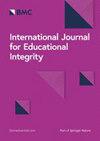Recommendations for a balanced approach to supporting academic integrity: perspectives from a survey of students, faculty, and tutors
IF 6.9
Q1 EDUCATION & EDUCATIONAL RESEARCH
International Journal for Educational Integrity
Pub Date : 2022-09-12
DOI:10.1007/s40979-022-00116-x
引用次数: 3
Abstract
Maintaining academic integrity is a growing concern for higher education, increasingly so due to the pivot to remote learning in 2020 caused by the COVID-19 pandemic. We canvassed students, faculty, and tutors at an online Canadian university about their perspectives on academic integrity and misconduct. The survey asked how the university could improve policies concerning issues of academic integrity, how faculty and tutors handled cases of misconduct, about satisfaction with how academic violations were treated, and about the role of students, faculty, and tutors in encouraging academic integrity. As well, we collected suggestions from respondents for reducing cheating, addressing academic misconduct, and general ideas about academic integrity. The distinction between misconduct and integrity was not always clear in their comments. We received responses from 228 students and 73 faculty and tutors, generating hundreds of comments. In this paper we focus only on the answers to open-ended questions. Using content analysis, we categorized the replies into similar threads. After multiple iterations of analysis, we extracted three general recommendation groupings: Policy and Procedures, Compliance and Commitment, and Resources. Based on respondents’ views, we propose a balanced approach to supporting academic integrity. Although we conducted the study pre-COVID-19, the recommendations apply to current and future academic integrity practices in our context and beyond.关于支持学术诚信的平衡方法的建议:来自学生、教师和导师调查的观点
维护学术诚信是高等教育日益关注的问题,尤其是在2019冠状病毒病大流行导致2020年转向远程学习的情况下。我们调查了加拿大一所在线大学的学生、教师和导师,了解他们对学术诚信和不端行为的看法。该调查涉及的问题包括:大学如何改进有关学术诚信问题的政策,教师和导师如何处理不当行为,对学术违规行为的处理方式的满意度,以及学生、教师和导师在鼓励学术诚信方面的作用。此外,我们还收集了受访者对减少作弊、解决学术不端行为以及学术诚信的总体看法的建议。在他们的评论中,不当行为和正直之间的区别并不总是很清楚。我们收到了228名学生和73名教师和导师的回复,产生了数百条评论。在本文中,我们只关注开放式问题的答案。使用内容分析,我们将回复分类为相似的线程。在分析的多次迭代之后,我们提取了三个一般的建议分组:政策和程序、遵从和承诺,以及资源。根据受访者的观点,我们提出了一种平衡的方法来支持学术诚信。虽然我们在covid -19之前进行了这项研究,但这些建议适用于我们当前和未来的学术诚信实践。
本文章由计算机程序翻译,如有差异,请以英文原文为准。
求助全文
约1分钟内获得全文
求助全文
来源期刊

International Journal for Educational Integrity
EDUCATION & EDUCATIONAL RESEARCH-
CiteScore
6.90
自引率
26.10%
发文量
25
审稿时长
22 weeks
 求助内容:
求助内容: 应助结果提醒方式:
应助结果提醒方式:


